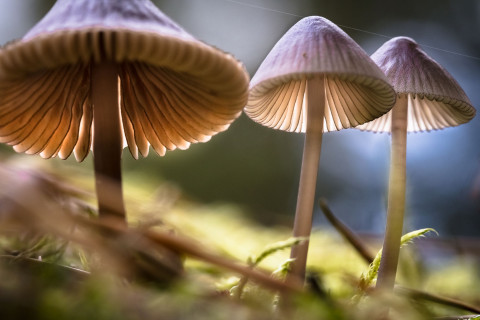The doctoral dissertation in the field of Biology will be examined at the Faculty of Science and Forestry, Joensuu Campus and online.
What is the topic of your doctoral research? Why is it important to study the topic?
Fungal fruiting bodies are widely eaten by a wide repertoire of organisms. Aside from humans, reindeers, and squirrels, the most abundant group of these animals are insects. At least hundreds of insect species in Finland alone are associated with fungi. Fruiting bodies and their arthropods form a network with a significant contribution to forest biodiversity. Yet, studying the structures of these interaction networks has been slow. In my thesis, I aimed to explain the structure and guiding principles of these networks, the life histories of fungus-associated arthropods, and how these change with and along e.g. host, decay stage and phylogenetic and geographic distance.
What are the key findings or observations of your doctoral research?
In my thesis I studied both the fruiting of fungus, as well as the structure of the fungus-arthropod food webs. For this, I collected both fruiting body data and complete fruiting bodies. The fruiting of fungi was heavily affected by forest age, heat sum and dominant tree, with a considerable phylogenetic component. For metabarcoding the arthropod communities, I developed a method for extracting DNA from complete fruiting bodies. This, in turn, allowed us to produce fruiting body – arthropod community data. After testing the method on arthropods, fungi and bacteria to determine host specificity patterns, we sampled a 1300-km latitudinal gradient to study the arthropod communities at larger scale.
Overall, fungus-associated arthropods – as well as bacteria and fungi - are dominated by generalists, with some taxa showing a response to host phylogeny. Turnover in species community is significant at all scales from latitudinal to local and from phylogenetic to decay stage distance; meanwhile, arthopod species richness remains markedly constant across the latitudinal gradient. As a general conclusion, the ephemeral nature of fruiting bodies seems to favour generalism as an overall strategy among fungivores. My thesis is among the first molecular studies of fungus-arthropod communities, and was explicitly designed to target mushrooms of human interest as well.
How can the results of your doctoral research be utilised in practice?
The metabarcoding method I developed for this thesis allows for fast, cheap mass sequencing of entire fruiting bodies. The method is straightforward and simple, and can be utilized in a wide variety of ecological studies. These include how habitat and ecosystem changes affect fungal and fungivorous communities, and how the communities utilizing an ephemeral resource live.
What are the key research methods and materials used in your doctoral research?
My thesis was born from both a general interest in fungi and arthropods, as well as a discovery of a suitable research network. I chose molecular ecology as a route soon after beginning the thesis itself. For the materials, I collected transect data of fungal communities from North Karelia. For sequencing and inference of arthropod communities, we collected fungal samples. Fungi were collected from North Karelia, as well as from a 1300-km gradient utilizing volunteers. I developed a method for mass sequencing entire fruiting bodies, which allowed us to determine the species present in individual fruiting bodies, regardless of the species’ life stage. This produced a fruiting body x target taxa community matrix, which was basis for further inference.
I completed my thesis in EPHB doctoral programme of University of Eastern Finland, as a part of Joensuu Molecular Ecology Group. I was also a visiting researcher at University of Helsinki, Spatial Food Web Ecology Group. Assistance, guidance, collaboration and support were also provided by Norwegian NIBIO, Swedish University of Agricultural Sciences, REC group of University of Helsinki, University of Jyväskylä and University of Turku.
The doctoral dissertation of Janne Koskinen, MSc, entitled Fungus–arthropod food webs in Boreal forests, will be examined at the Faculty of Science and Forestry. The Opponent will be Professor Vojtěch Novotný, Czech Academy of Sciences, Czech Republic, and the Custos will be Senior Researcher Anu Valtonen, University of Eastern Finland. Language of the public defence is English.
For more information, please contact:
Janne Koskinen, [email protected], tel.+358 40 704 1792, Twitter @jskoskinen



